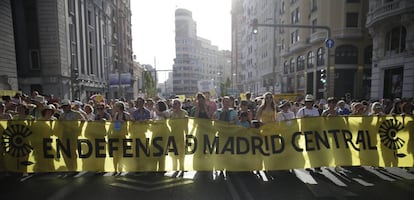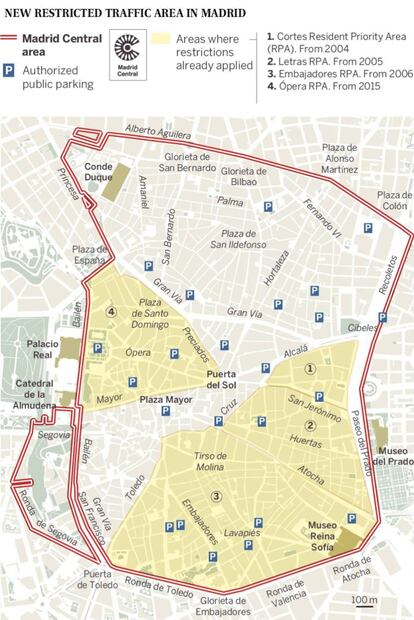On judge’s orders, Madrid Central low-emissions scheme back in action
Motorists entering parts of the Spanish capital will face fines once more, after a court suspends the new Popular Party mayor’s decision to temporarily halt the system

Fines for entering the Madrid Central low-emissions zone were reactivated at midnight on Sunday, after a judge overturned a decision by the new city council to suspend the scheme.
The move to suspend fines caused widespread anger among residents of the Spanish capital, prompting a street protest
Mayor José Luis Martínez-Almeida, of the conservative Popular Party (PP), took the decision to temporarily halt the fines for vehicles that entered the central area, backed by his partners in City Hall, center-right Ciudadanos (Citizens), and the far-right party Vox, upon whose votes the PP needed to take power and will rely on to pass legislation.
However, the move caused widespread anger among residents of the Spanish capital, prompting a street protest last week as well as hitting the headlines around the world, with Madrid becoming the first major European city to actually roll back a measure aimed at improving pollution levels. A year ago, the Madrid Central project was instrumental in sparing Spain legal action by the European Commission before the EU Court of Justice. At that point, the Spanish capital had been exceeding European pollution thresholds for nearly a decade.
On Friday a Madrid court took the precautionary measure of suspending the mayor’s moratorium to, in the words of the judge, avoid pollution from rising “without any kind of controls.” City Hall has been given three days to present its defense for the move. The decision came in response to a lawsuit filed by a body known as Platform in Defense of Madrid Central, which is made up of more than 80 organizations, including environmental NGOs Ecologists in Action and Greenpeace.

The Socialist Party (PSOE), which is in opposition in Madrid City Hall, also resorted to the courts to appeal the move, which it considers to be “illegal.”
Madrid Central was the star scheme introduced by former Madrid Mayor Manuela Carmena, of the leftist Más Madrid party. Carmena, a former judge, won the most votes at the May 26 municipal elections, but fell short of a majority, paving the way for the PP and Ciudadanos to take power with the support of Vox. All three of the latter parties had campaigned on making major changes to the Madrid Central scheme, with the general secretary of Vox, Javier Ortega-Smith, stating on the night of the election results that “from tomorrow, Madrid Central is over.” For its part, the PP said that it wanted to go back to an earlier traffic-restriction system based on priority for residents established by its former mayor, Ana Botella.
In the second quarter of this year, the pollution levels in the Spanish capital were the best seen in a decade
But with the judge’s decision, from today vehicles that do not have permission to enter the low-emissions zone will once again be fined €90, or €45 if the amount is paid immediately. Electric and hybrid cars with the “Cero” and “Eco” badges issued by Spain’s DGT traffic authority will be able to freely move around the 472-hectare area, while cars with “B” and “C” badges – newer diesel and gasoline models – will be able to enter if they then park in a public parking lot, or if they have an invitation from a resident. Older, more polluting cars without badges will not be able to enter the zone, although under the current rules they will be able to do so if they have an invitation from a business or resident.
The Madrid Central scheme began to function on November 30 of last year, with drivers initially receiving warning letters for infractions. On March 16, the system of fines went into action, and was in place until June 30, when Mayor Martínez-Almeida suspended it.
In the second quarter of this year, the pollution levels in the Spanish capital were the best seen in a decade, with the scheme also reducing the levels of traffic in the center and improving the frequency of buses. The suspension of the scheme by City Hall last week saw traffic levels rise and air quality fall.
English version by Simon Hunter.
Tu suscripción se está usando en otro dispositivo
¿Quieres añadir otro usuario a tu suscripción?
Si continúas leyendo en este dispositivo, no se podrá leer en el otro.
FlechaTu suscripción se está usando en otro dispositivo y solo puedes acceder a EL PAÍS desde un dispositivo a la vez.
Si quieres compartir tu cuenta, cambia tu suscripción a la modalidad Premium, así podrás añadir otro usuario. Cada uno accederá con su propia cuenta de email, lo que os permitirá personalizar vuestra experiencia en EL PAÍS.
¿Tienes una suscripción de empresa? Accede aquí para contratar más cuentas.
En el caso de no saber quién está usando tu cuenta, te recomendamos cambiar tu contraseña aquí.
Si decides continuar compartiendo tu cuenta, este mensaje se mostrará en tu dispositivo y en el de la otra persona que está usando tu cuenta de forma indefinida, afectando a tu experiencia de lectura. Puedes consultar aquí los términos y condiciones de la suscripción digital.








































